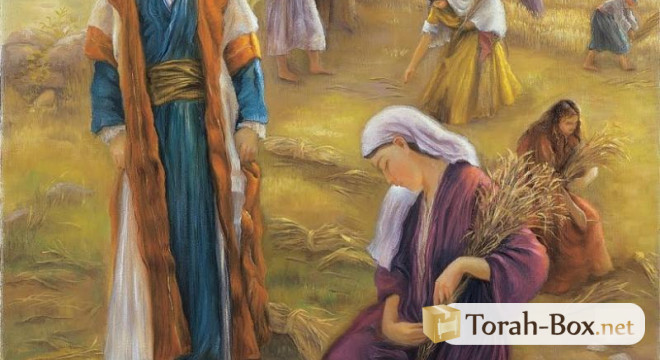
Women
Ruth or Meritocracy in Judaism
Ruth embodies the Torah's quintessential "woman of valor". She is privileged to incarnate the most desirable feminine qualities, such as modesty, devotion, wisdom, and finesse, all imbued in her great strength of character. If you believe this privilege is inborn or innate, think again. Ruth was a princess of the people of Moav, a place best known for its cruelty and tendency towards perversion and debauchery.
How does a woman of such dishonorable origins gain the merit not only of embodying the most remarkable traits of a Jewish woman, but also of giving birth to the lineage of King David and the dynasty of the Messiah? Ruth's incredible transformation conceals her true and unique message.
Strength of character
Her story unfolds shortly after the conquest of the country, at the time when Judges ruled Israel. At that time, a notable man named Elimelech emigrated to the land of Moav following the outbreak of a disastrous famine that plagued Israel. Elimelech settled in the neighboring land and spent time in the King's court. Thus, Ruth and her sister Orpah met Elimelech 's sons and his virtuous wife, Naomi. Ruth, who exuded an aversion to idolatry, showed great admiration for Jewish values and tradition. Thus, she joyfully and unregretfully abandoned her life of luxury at the royal palace and her title of princess to marry Machlon, the son of Elimelech.
Kindness to her mother-in-law
Fate turned against Elimelech and his sons; all three died. Scripture states their death was caused by Divine decree, because they abandoned the Jewish People and the land of Israel amidst a disastrous famine. Naomi found herself alone and miserable and implored her daughters-in-law: "Go home to your mother's house, may the Lord reciprocate the affection you have shown me and my deceased sons. May the Almighty restore upon you a peaceful home life with new husbands. "Unlike Orpah, who was relieved by this suggestion, Ruth was absolutely adamant in her decision to follow her mother-in-law at all costs.
Her reply is Judaism's most beautiful love declaration: "Do not urge me to leave you and turn back from following you; for where you go, I will go, and where you lodge, I will lodge. Your people shall be my People, and your God, my God. Where you die I will die and there I will be buried. Thus, may the Lord do to me, and worse, if anything but death parts you and me". Ruth readily turned down her life of luxury and royal rank to follow Naomi on foot to the land of Israel, towards a life of misery. She didn’t mind paying the price to be close to God and to become a member of the Jewish people.
Modesty
Naomi and Ruth reached Bethlehem barefooted and looking pitiful, causing a huge stir among the residents. The women wore rags and had nothing to live on.
Wishing to spare her mother-in-law the humiliation and embarrassment to go begging for food, she decided to tackle their misery on her own.
Fate led her to a field owned by Boaz, a rich and kindhearted member of Elimelech's family. Thus, she spent her days working hard, harvesting the field reserved for the poor, gleaning the stubbles and picking sheaves that had fallen inadvertently. This was Ruth's daily work load.
She found favor in the eyes of the land owner, Boaz, who singled out her distinction amid the other girls. She did not respond to the men who tried to distract her and took the utmost care when she bent over, so as not to reveal the skin from her legs, nor attract undue attention.
Boaz let her know she was welcome to come back and promised to protect her while she gleaned in his field. She thanked him and promised to come back.
Ruth returned with an abundant harvest and felt deeply touched by Boaz' kindness. She reported to Naomi about her exchange with the distinguished and generous land owner.
Naomi was overjoyed that destiny had led Ruth to a family member because, according to Jewish law, Boaz, as a relative of the deceased was entitled to buy land that once belonged to his uncle Elimelech and marry his deceased cousin's widow to ensure offspring.
Kindness Towards the Deceased Family Member
Naomi acted as a matchmaker and intervened on Ruth's behalf. Boaz was positively inclined to marry a woman of such valor. However, a closer relative to Elimelech had the first choice by birthright.
The latter was informed on the matter but declined the purchase of the land and the application of the levirate. This allowed Boaz to wed Ruth.
Boaz and Ruth's union is a symbol of greatness and an act of loving-kindness on behalf of Machlon, Naomi's son. The levirate law allows the widow of a childless deceased father to marry a close relative to eternalize his memory and ensure he has a descendance. This incredible act of kindness equals bestowing life upon the deceased.
Ruth gave birth to Oved. Oved gave birth to Yishay and Yishay gave birth to David.
Ruth was privileged to live to old age and was blessed with the privilege of seeing her great grandson David access the throne.
Torah-Box.net Account
To access the entire Torah-Box.net website, sign up for free in less than a minute.
Weekly Parsha
 Candle Lighting - New York
Candle Lighting - New York
Friday December 26th, 2025 at 16:16 *Shabbat ends at 17:22 *
change my location
* Times given as an indication, check the times of your community








